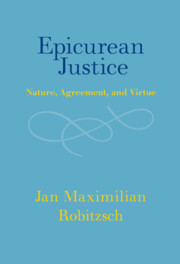Book contents
- Epicurean Justice
- Epicurean Justice
- Copyright page
- Dedication
- Contents
- Acknowledgments
- Introduction
- Chapter 1 The Origin of Justice
- Chapter 2 Contractual Justice
- Chapter 3 Aretaic Justice
- Chapter 4 Moral Psychology
- Chapter 5 Justice and Law
- Chapter 6 Ethical Naturalism
- Chapter 7 Conclusion
- Book part
- Bibliography
- Index Locorum
- General Index
Introduction
Published online by Cambridge University Press: 07 March 2024
- Epicurean Justice
- Epicurean Justice
- Copyright page
- Dedication
- Contents
- Acknowledgments
- Introduction
- Chapter 1 The Origin of Justice
- Chapter 2 Contractual Justice
- Chapter 3 Aretaic Justice
- Chapter 4 Moral Psychology
- Chapter 5 Justice and Law
- Chapter 6 Ethical Naturalism
- Chapter 7 Conclusion
- Book part
- Bibliography
- Index Locorum
- General Index
Summary
This chapter discusses the nomos-phusis debate of the fifth and fourth century BCE and introduces the book’s main argument: that the Epicureans defend a sophisticated middle position (vis-à-vis Plato and Aristotle, on the one hand, and some sophists, on the other) in this debate when it comes to justice. On the Epicurean view, justice is neither fully natural nor conventional; there is a robust virtue of justice and it is always better to be just than to be unjust, but it is not always better to obey the laws.
- Type
- Chapter
- Information
- Epicurean JusticeNature, Agreement, and Virtue, pp. 1 - 13Publisher: Cambridge University PressPrint publication year: 2024

